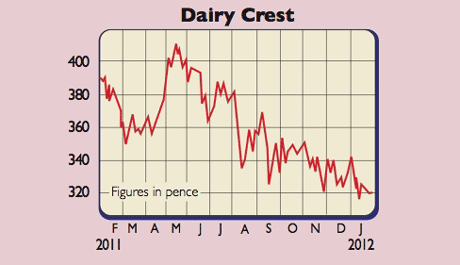Get the latest financial news, insights and expert analysis from our award-winning MoneyWeek team, to help you understand what really matters when it comes to your finances.
You are now subscribed
Your newsletter sign-up was successful
Want to add more newsletters?

Twice daily
MoneyWeek
Get the latest financial news, insights and expert analysis from our award-winning MoneyWeek team, to help you understand what really matters when it comes to your finances.

Four times a week
Look After My Bills
Sign up to our free money-saving newsletter, filled with the latest news and expert advice to help you find the best tips and deals for managing your bills. Start saving today!
The scarcity principle that as assets dry up, prices rise is key to investing. Take the mergers and acquisitions (M&A) arena, where German yogurt and cheese maker Mller has just forked out £280m for Robert Wiseman Dairies. Excluding Arla, which is probably off limits due to its complex ownership structure, there is now only one big milk producer potentially up for grabs: Dairy Crest.
The attraction for buyers is that the industry is relatively stable and insulated from low-cost imports. Fresh milk and yogurt is produced locally due to its short shelf life, and Britain's distinctive cheeses and spreads obtain their rich flavours from the grass eaten by domestically reared cattle. This is the reason Dairy Crest is so special: it's the last trophy asset' in its sector.
So, how much is the business worth on a sum-of-the-parts basis? The milk division is similar to Robert Wiseman's, and thus should be worth seven-times earnings before interest, tax and amortisation (EBITA) about £175m. The firm owns five leading brands with entrenched positions in their chosen field: Clover, County Life, Cathedral City, Frijj and St Hubert (the largest non-butter spread in Italy and second-biggest player in France).
MoneyWeek
Subscribe to MoneyWeek today and get your first six magazine issues absolutely FREE

Sign up to Money Morning
Don't miss the latest investment and personal finances news, market analysis, plus money-saving tips with our free twice-daily newsletter
Don't miss the latest investment and personal finances news, market analysis, plus money-saving tips with our free twice-daily newsletter
This brand strength is important for consumer loyalty and because it adds balance to the production process. Short-life, low-fat yogurts and milk, for example, discard a lot of excess fat and cream, which is typically chucked away. By integrating a longer-life product, such as cheese or butter, a big firm such as Dairy Crest enjoys better earnings resilience and reduces its exposure to commodity swings.
Dairy Crest (LSE: DCG), rated a BUY by Socit Gnrale

The company is performing admirably in the current climate. In the six months to September, branded sales and EBITA were up 5% and 20% respectively, to £260m and £48.2m. As such, I'd rate the division on a nine-times EBITA, which, added to the milk arm, generates an enterprise value of about £1,030m. From this, net borrowings of £365m and a £110m pension deficit need to be deducted to arrive at an intrinsic worth of £580m, or more than 400p a share. Under takeover conditions, a competitive auction, perhaps involving the likes of Danone and Yoplait of France, or Dr Oetker of Germany, could push the valuation to more like 500p.
What are the risks? The firm has been affected by elevated input costs, which are partly being offset by efficiency measures and price increases, and its doorstop delivery service is being hurt by the supermarket price wars. The company is also taking action to reduce its debt from its current level of 2.6 times EBITDA.
However, with a 6% dividend yield, Dairy Crest still rates as a long-term buy. Investment bank Socit Gnrale has a 380p price target. The next trading update is expected late March or early April.
Paul Hill also writes a weekly share-tipping newsletter, Precision Guided Investments. See www.moneyweek.com/PGI , or phone 020-7633 3634 for more information.
Get the latest financial news, insights and expert analysis from our award-winning MoneyWeek team, to help you understand what really matters when it comes to your finances.
Paul gained a degree in electrical engineering and went on to qualify as a chartered management accountant. He has extensive corporate finance and investment experience and is a member of the Securities Institute.
Over the past 16 years Paul has held top-level financial management and M&A roles for blue-chip companies such as O2, GKN and Unilever. He is now director of his own capital investment and consultancy firm, PMH Capital Limited.
Paul is an expert at analysing companies in new, fast-growing markets, and is an extremely shrewd stock-picker.
-
 Can mining stocks deliver golden gains?
Can mining stocks deliver golden gains?With gold and silver prices having outperformed the stock markets last year, mining stocks can be an effective, if volatile, means of gaining exposure
-
 8 ways the ‘sandwich generation’ can protect wealth
8 ways the ‘sandwich generation’ can protect wealthPeople squeezed between caring for ageing parents and adult children or younger grandchildren – known as the ‘sandwich generation’ – are at risk of neglecting their own financial planning. Here’s how to protect yourself and your loved ones’ wealth.